


































































































































































































































































































































































































































































































































































































































































































































































































Dear Colleagues,
As we reflect on the past year, I want to begin by extending my heartfelt thanks to the many volunteers, our dedicated Board of Directors, and the exceptional staff whose dedication and resilience have carried us through the past 12 months. Despite the challenges we’ve faced, we’ve celebrated many triumphs as well. President Law has highlighted several of the achievements from this report in her message, but I encourage you to read through the entire report.
AACP members and staff have been working hard to transform pharmacy education and practice through research, teaching and service. The future holds many reasons for optimism, including rising numbers of applicants and applications across our member programs, strong attendance at our virtual and in-person meetings, and the continued growth of AACP Learn, our learning management system.
I am proud of what we have accomplished together and hopeful that the new academic year will bring AACP and the profession even more opportunities to make a difference in patient care.
With best regards,
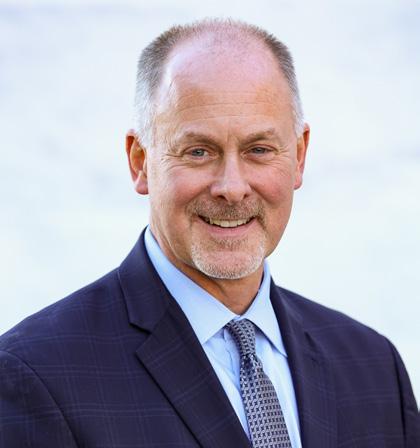
Lee Vermeulen, B.S.Pharm., M.S., FCCP, FFIP
Executive Vice President and CEO
American Association of Colleges of Pharmacy
Dear AACP Members,
It is my distinct honor to serve as 2024–2025 President of AACP, and I am pleased to present this year’s Annual Report.
Our Association has continued to Reach Out, Engage and Elevate pharmacy education, practice and the wider healthcare landscape. This past year has brought both opportunities and challenges, and thanks to the unwavering commitment of our members, partners, and leadership, we have made notable strides. I am continually inspired by the passion and expertise within our community, and I look forward to sharing some of the highlights from 2024–25 below. I encourage you to read more about these accomplishments in the full report.
Ɂ Open Individual Membership Model—In the fall of 2024, the AACP Board of Directors approved a proposal to transition our individual membership model to one which provides faculty, professional staff, and others tied to our colleges and schools of pharmacy, with complimentary membership. This spring, AACP began to roll out this new program and has increased its individual membership from just under 5,000 individuals to more than 14,700 individual members.
Ɂ Enhancements to the “Pharmacy is Right” for Me Website—In January 2025, AACP launched the redesigned Pharm4Me website, featuring personal stories from pharmacy professionals, understandable admissions guidance, an updated Pharmacy Career Quiz, improved navigation and a refreshed design.
Ɂ Medical Billing Workshop—The virtual “How to Teach Medical Billing Basics: A HandsOn Workshop” prepared more than 70 pharmacy educators to teach the basics of medical billing to pharmacy students as part of the Pharm.D. curriculum. Workshop objectives included identifying and applying appropriate medical billing codes to pharmacy patient care cases and creating lesson plans and instructional materials.
Ɂ Grant Writing Workshop—The Guided Grant Writing for Pharmacy Faculty program launched in February 2025 with 29 participants who committed to completing AACP Learn modules on grant writing, meeting monthly with facilitators and AACP staff to discuss grant writing and preparing a research or research career development proposal during the course of the program.
Ɂ Microlearning Miniseries—AACP’s Microlearning Miniseries provides learners with brief educational content, accessible and engaging modalities. This is the second year of this free educational resource that is made available in the fall and spring semesters. Some key topic areas included in the 2nd year were artificial intelligence, active learning techniques, and critical thinking.
Ɂ American Journal of Pharmaceutical Education Editor-in-Chief Transition—After more than a decade of dedicated leadership, Dr. Gayle Brazeau is stepping down as Editor-inChief of AJPE at the end of 2025. Earlier this year, AACP issued a call for applications for the Editor-in-Chief role and received 22 applicants. The new Editor-in-Chief will assume the position by January 1, 2026.
These highlights, together with the full range of accomplishments detailed in this Annual Report and our ongoing member programs, reflect the meaningful impact we can make on the future of pharmacy education, research, and practice when we unite around shared goals and a common purpose. Thank you to each of you for your continued support, engagement, and commitment to shaping the future of pharmacy education.

Anandi V. Law, B.Pharm., M.S., Ph.D., FAPhA
2024–2025 AACP President
Professor of Pharmacy Practice and Administration
Associate Dean for Assessment
Western University of Health Sciences College of Pharmacy


































































































































































































































The 2024–2026 AACP Strategic Plan, approved by the House of Delegates in July 2024, maps out the course for planning, executing and evaluating the organization’s priorities, goals and objectives. The 2024–2026 strategic theme, “Empowering the Pharmacy Academy and Pharmacists to Impact the Health Care Landscape,” calls for intentional and constant work in an ever-changing health care environment. The initial year of the strategic plan (2024–2025) has reinforced the essential role of pharmacists as a mighty feature in that landscape. The contemplative plan guides the Association to organizational effective performance and success. Using the “continuous strategy process,” AACP’s strategic planning is ongoing through time cycles (not tied to an episodic, time-based strategic plan model) that allow the Association to be nimble, creative, proactive and responsive to the myriad of health care and societal changes affecting the pharmacy profession. AACP’s strategic framework combines a chain of elements starting with developing strategic priorities, goals and objectives; then implementing action plans and activities (documented in strategic action plans) using necessary and available inputs to yield outputs, measurable outcomes and impacts.
Our four strategic priority areas include Education, Practice, Research and Scholarship, taken from the AACP Mission, as well as Outreach and Engagement. AACP has developed a set of goals and objectives for each strategic priority area. Our governance, leadership and affinity groups (Sections and SIGs) and staff then develop “strategic action plans,” outlining what actions and activities to execute, in alignment with and support of the association-wide strategic plan. These actions and activities help AACP determine if the Association has followed through on stated goals, tracking the outputs or results of those actions. Next, we measure outcomes and impacts from the execution of the strategic plan across all action plans. We categorize our outcome highlights and impacts into issues or theme areas as follows: (1) pharmacy workforce; (2) pharmacy workplace; (3) practice advancement and transformation; and (4) member success and effectiveness (individual and institutional). With this framework as the basis, we operate under the idea that one strategic plan with multiple strategic action plans leads to major outcomes and impacts.
What has the Academy accomplished in Year 1 of the 2024–2026 strategic plan?
To highlight AACP’s successful strategic initiatives and efforts, the first section of this 2025 Annual Report, organized by the Strategic Priority areas, captures the major activities and achievements for the 2024–2025 year. The second section includes descriptions of additional Academy Highlights for the 2024–2026 strategic cycle.
The implementation of the strategic plan involves the actions and activities of the Councils, Sections, SIGs, Committees and Taskforces across the Association. The depth of this involvement helps to “give life” to the strategic plan, where many members see what they do individually, contributing to the collective success of the Association’s achievements.
Several strategic actions have been designed in this initial year, planned for implementation late in Year 1 and into Year 2. These actions frequently include: programming (webinars, Annual Meeting programming); member mentorship; networking events, newsletters and other member engagement activities; resource development and sharing; research and scholarship collaborations; and awards/recognitions. More details on the progress of these activities and achievements will be shared in time.
2024–2026 Strategic Plan
Empowering the Pharmacy Academy and Pharmacists to Impact the Health Care Landscape
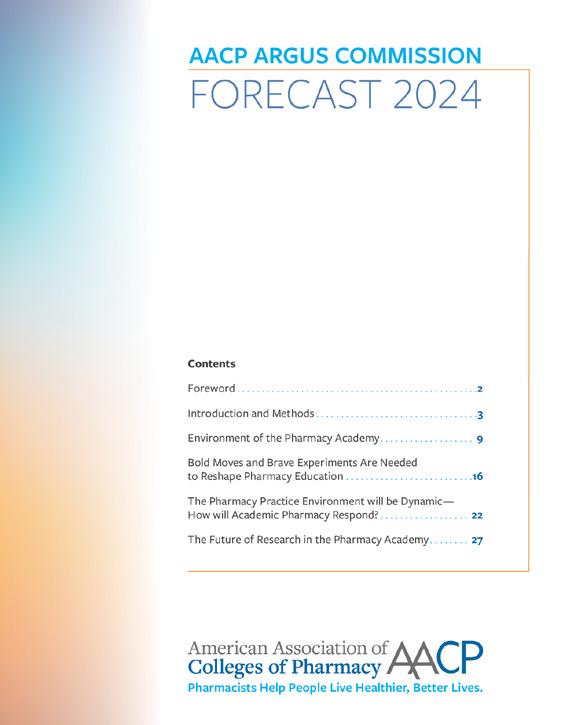
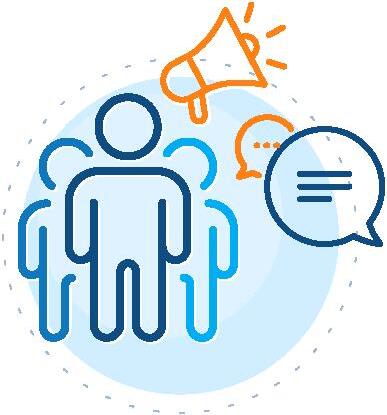
The advancement of pharmacy practice depends on having a robust pharmacy workforce. This calls for increasing the number of learners/trainees, faculty, preceptors, pharmacy technicians and academic staff from all demographics, cultures and backgrounds to be part of the expanding pharmacy education, pharmacy practice and AACP landscape. Under the Outreach and Engagement priority area, increases in enrollment, AACP membership and advocacy, supporting strategic engagement efforts, advance and expand the capacity for pharmacists, future practitioners and other pharmacy profession personnel to provide optimal care for individuals and populations. Under this priority area, we are keeping abreast and vigilant of emerging developments, communicating with our members, and promptly responding to inquiries or views related to the profession.
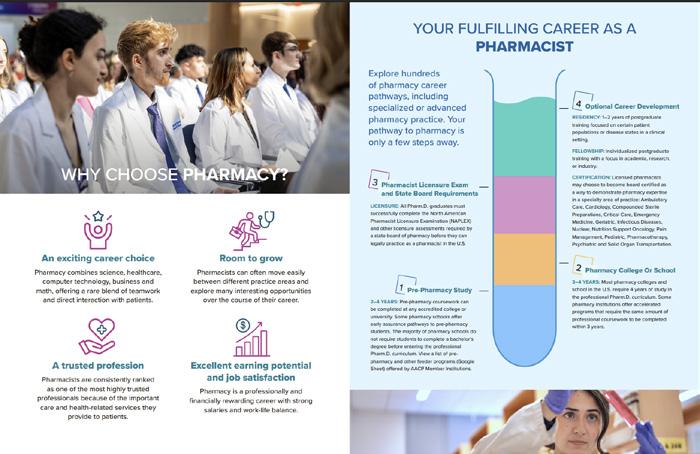
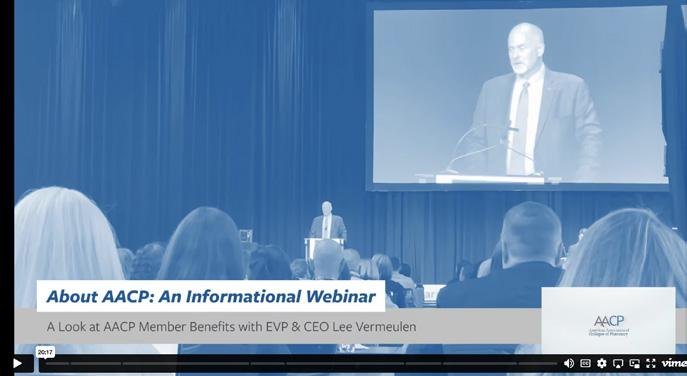
In January 2025, we launched the redesigned Pharm4Me website, featuring personal stories from pharmacy professionals, understandable admissions guidance, an updated Pharmacy Career Quiz, improved navigation and a refreshed design—all aimed at engaging and inspiring future pharmacy students. The Pharmacy Careers pages were expanded to include a variety of patient care and research-focused careers.
New “Pharmacy is Right for Me” recruitment resources were developed and added to our website for public use. Designed for a wide range of audiences— elementary, middle and high school students, as well as advisors and educators—these materials aim to spark interest in pharmacy careers.
In February 2025, the AACP House of Delegates approved the proposed “open” membership model, which grants a complimentary individual membership to all faculty, professional staff and those individuals who have substantial roles
at member colleges and schools of pharmacy. This spring, AACP began to roll out this new program by soliciting all member institutions for the names of faculty and staff members to participate in the program. AACP received a robust response from our member institutions, who sent in nearly 10,000 new individuals to take part in the open membership program. In total, AACP increased our individual membership from just under 5,000 individuals to over 14,700 individual members.
In June 2025, AACP began to reach out to new members to welcome them to the organization, including a welcome video and a first-year membership roadmap. We have expanded the new member content at the Annual Meeting, and are collaborating with Council, Section and SIG leaders to engage new members. By encouraging active participation in the first year, AACP’s onboarding process aims to build long-lasting connections between new members and the Association.
The goal of this taskforce is to generate a list of actions to improve communication and collaboration between the AACP Sections and SIGs. Examples of tactics to accomplish this include sharing resources, leadership development, increasing engagement, social events and collaboration on projects.
AACP is committed to the principles of Inclusive Excellence, which recognizes how organizational, community and institutional success depends on acknowledging and embracing a diversity of backgrounds, perspectives and voices. The Association aims to prepare and sustain a pharmacy workforce ready to address health disparities and advance healthy lives for all people.
The Institute for Inclusive Excellence convened in May 2025, and the Pharmacy Advances Clinical Trials (PACT) Network project (funded by FDA and Genentech) received attention at two significant conferences the same month: Xavier University’s 18th Annual Health Disparities Conference in New Orleans, as well as the American Pharmacists Association Annual Meeting in Nashville.

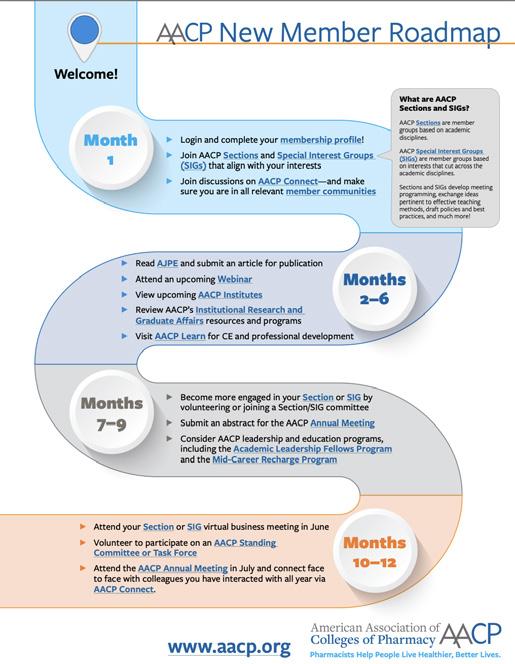

The project intends to build and pilot test a model involving pharmacy academia, community pharmacists and community-based organizations prepared to address barriers to clinical-trial research through increasing awareness and knowledge about clinical trials among community members.
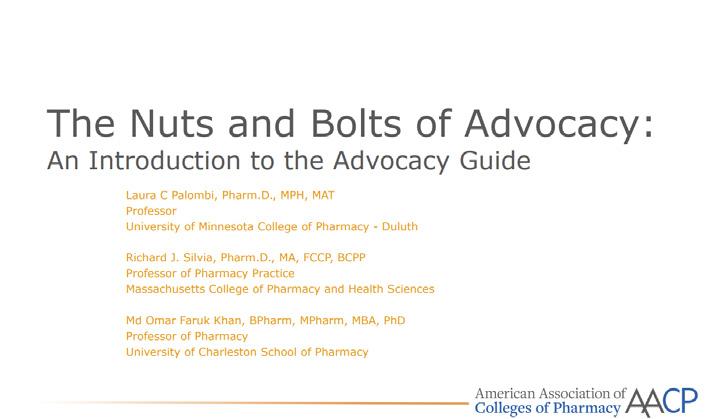
The 2024–2025 Strategic Engagement Committee (SEC) has updated the AACP Advocacy Guide for Pharmacy Practice and Education inclusive of member submitted advocacy practices to inspire innovation across the Academy. Based on member feedback, new sections of the guide include an updated executive summary, the importance of advocacy, and instructions on how to use the resource guide.
Members can search the new Advocacy Activities Catalog by advocacy focus, level of advocacy, region, collaborators, institutional support, and other search terms to gain desired information for planning their next advocacy activity. The SEC will continue to gather advocacy activities for inclusion into the database over time for member use.
This newly updated resource also includes educational outcomes for members to assist in achieving Accreditation Council for Pharmacy Education 2025 Standard 2.1.f - Advocacy (Advocate). Example learning outcomes and objectives were submitted by members focused on government, professional, and patient advocacy. Members also submitted various forms of assessments that are utilized to formally assess these outcomes including but not limited to reflections, case discussions, co-curricular activities, objective structured clinical examination (OSCE), and formal assessments via quizzes or exams which are also included in the updated AACP Advocacy Guide.
AACP and its members are responsible for educating and preparing pharmacists, faculty and academic staff who are ready to lead or engage in advancing pharmacy education and training, practice and research. Here is where AACP and its members will identify and commit to the competencies essential to achieving and sustaining a thriving and impactful workforce. The goals and objectives under the Education priority area aim to move us closer to that optimal workforce through competency-based models for pharmacy admissions and matriculation, the use of innovative curricula and technology, and the assurance that student, faculty, preceptor and staff well-being is achieved and maintained with an emphasis on the workplace or academic well-being domain. Well-being is vitally important to the future of the profession and is defined not merely by the absence of disease, but as a state of physical, mental, social, intellectual, environmental, vocational, financial and spiritual health. By adopting a comprehensive and holistic approach to support well-being, AACP will enhance the lives of learners, educators, staff, pharmacists, other health care professionals and patients.
2024–2025 COD/COF ACPE 2025 Standards: Opportunities to the Academy Taskforce
The 2024–2025 Council of Deans (COD) and Council of Faculties (COF) Accreditation Council for Pharmacy Education (ACPE) 2025 Standards Taskforce was charged to review ACPE Standards 2025 and identify opportunities to advance academic pharmacy education to prepare graduates for advancements in pharmacists’ scope of practice and to ensure pharmacy school program quality. The joint taskforce obtained information from the Academy through coffee chats open to all members and a presentation at the 2025 AACP Interim Meeting in Houston. The taskforce’s final report will be available in July and will focus on six areas:

1. Preparing graduates for advancements in scope of practice (diagnosis/ prescribing).
2. Feedback on administrative leadership.
3. Programs and services to promote well-being (student, staff, faculty).
4. Programs and services to promote faculty and staff workload balance.
5. Changes to Introductory Pharmacy Practice Experience (IPPE) hours to allow a greater variety of patient care experiences.
6. Aligning curricular outcomes with Curriculum Outcomes and Entrustable Professional Activities (COEPA) and the Pharmacist Patient Care Process (PPCP).
A copy of this joint COD/COF taskforce final report can be found in the libraries of the COD and COF Connect Communities.
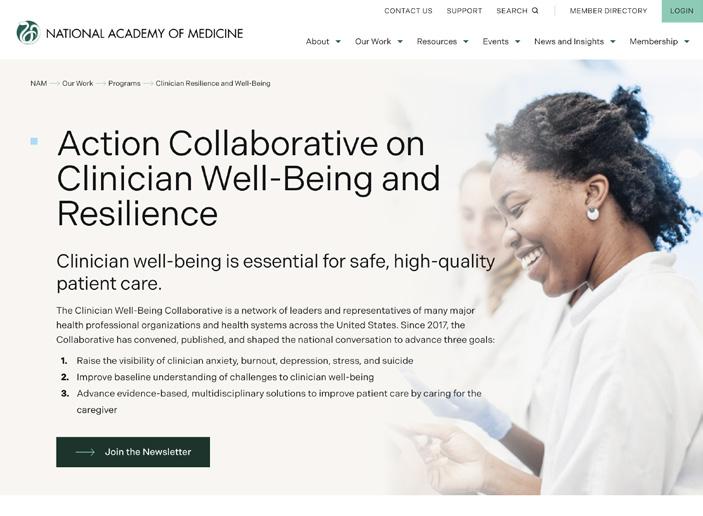
AACP continues to be engaged with the National Academies of Medicine (NAM) Clinician Well-Being Initiatives as part of its Accelerator for Change Maker campaign. AACP is one of only two pharmacy associations acting as an NAM Accelerator for this well-being initiative. AACP staff also continues serving on the Federation of Associations of Schools of the Health Professions (FASHP) Well-being Group, which shares association resources and ideas in support of well-being. The group explores common domains/fields to assess the well-being of faculty and students across professions.
The 2025–2026 Council of Deans (COD), Council of Faculties (COF) and AACP Institutional Research and Assessment Committee (IRAC) taskforce will work together to develop recommendations for a national well-being assessment tool for faculty and staff at colleges and schools of pharmacy. The taskforce charges are:
1. Analysis of the 2023–2024 COD/COF Addressing Burnout Taskforce work and the existing tools that assess well-being and burnout to determine the domains of a well-being assessment tool for faculty and staff.
2. Request colleges and schools share what was submitted to ACPE as part of their readiness report for Standards 2025 to inform a possible national assessment tool for faculty and staff.
3. Exploration of components of existing wellness and well-being assessments for inclusion in a possible national assessment tool for faculty and staff.
4. A recommendation on the feasibility (including resources and a proposed timeline) of a national assessment tool to be administered by IRAC as part of the AACP survey program.
AACP continues to roll out and enhance a new longitudinal year-long program, the Mid-Career Recharge Program, for academic faculty and staff in mid-career. The endeavor will provide programming, coaching and support groups to generate a plan to recharge their career. A large component of the program pertains to well-being and resilience. To date, 76 AACP members have completed the program, with Cohort 2 graduating in May 2025 and Cohort 3 beginning in June 2025.

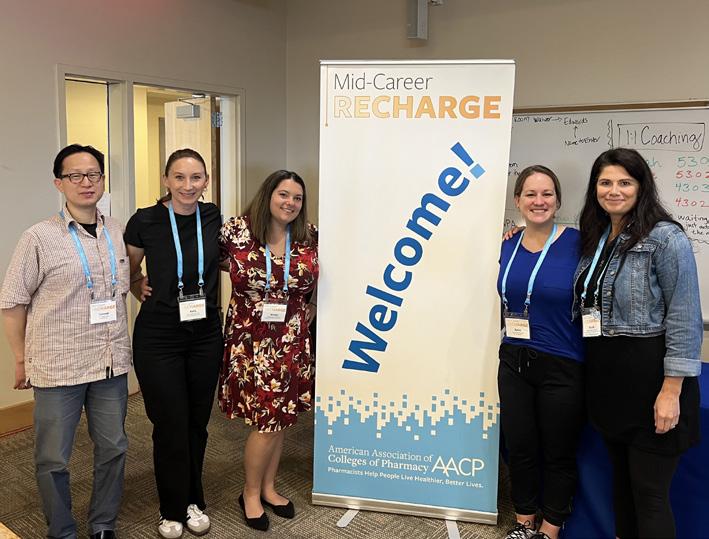
Community-based pharmacy practice is undergoing transition and transformation: A shift in mindset and actions from a primarily productbased and medication-dispensing care model to an expanded care model that encompasses not only medication products, but pharmacist-provided care and services. AACP supports the continued evolution of community pharmacy toward a primary care model with pharmacists serving the public by working with other members of the health care team to deliver products and clinical services within the full scope of their practice. The goals and objectives under the Practice priority can be implemented, for example, through the AcademiaCommunity Transformation (ACT) Pharmacy Collaborative Signature Programs and stimulating more learner (Pharm.D. and post-graduate), faculty, preceptor and researcher involvement in advocating for community-based pharmacy practice transformation efforts.
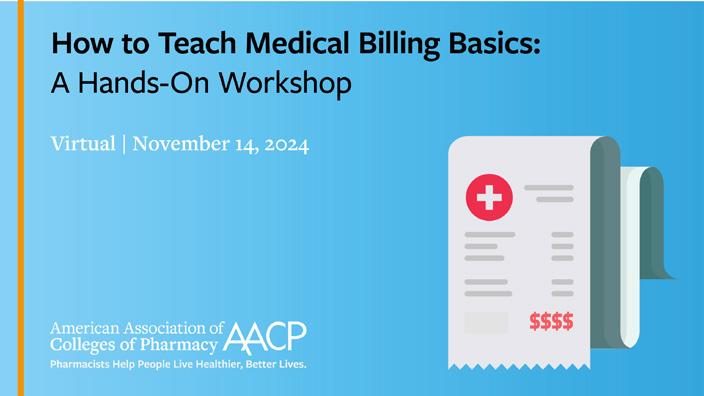
The virtual November 2024 AACP “How to Teach Medical Billing Basics: A Hands-On Workshop” prepared over 70 pharmacy educators to teach the basics of medical billing to pharmacy students as part of the Pharm.D. curriculum. Workshop objectives included identifying and applying appropriate medical billing codes to pharmacy patient care cases, creating lesson plans and instructional materials to equip student pharmacists with the skills needed to perform basic medical billing tasks in practice, and developing a plan to integrate medical billing concepts into the Pharm.D. curriculum. The recording and teaching materials from this workshop are available for purchase on AACP Learn.
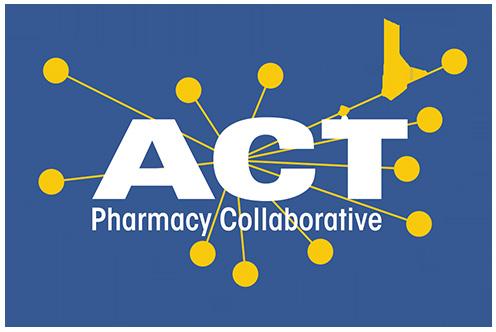
The inaugural cohort of the Academia-Community Transformation (ACT) Centers of Excellence held convenings during the 2024–2025 academic year. The four convenings—Prescription for Advocacy Success; Walking the Walk: Collaborating to Catalyze Practice Transformation; Charting the
Collective Course: Hosting Regional Convenings to Catalyze Implementation and Payment of Pharmacy Services; and Navigating the Future Together: Community Pharmacy Research—addressed advocacy opportunities, research opportunities, and evolving sustainable service models. This work, supported by a grant from the Community Pharmacy Foundation, has fostered a strong, national network of institutions committed to advancing and scaling impactful community pharmacy initiatives.
The second cohort of the Academia-Community Transformation (ACT) Pharmacy Collaborative Community Pharmacy Practice Transformation Educators Badge program began during the 2024–2025 academic year. Thirty-one faculty members utilized online coursework, engagement activities and networking opportunities to validate their competencies of the program, which include recognizing the opportunities and challenges within the evolving health care system to advance pharmacy services within community pharmacy, demonstrating of evidence-based change practices that drive implementation of pharmacy services, supporting of community pharmacy practice transformation through the application of educational resources and collaborative knowledge, and communicating the value of advanced pharmacy services in the community.
“Key
The 2025 Professional Affairs Committee finalized the Key Elements of Practice Redesign in Community Pharmacies document, which was initially drafted by the 2024 Professional Affairs Committee. Rapid changes in the payment model of medications leading to pharmacy closures are driving the urgent need for community pharmacy practice transformation. This document intends to inspire progressive, visionary discussion for the future needs of community pharmacy practice. The document provides an overview of the Philosophy of Practice, the Patient Care Process, and the Practice Management Ecosystem components for community pharmacy practice. The socialization and discussion of this document began in Spring 2025 with a focus group of leaders in chain community pharmacy practice and a presentation at the 2025 Pharmacy Quality Alliance (PQA) Annual Meeting. The 2026 Professional Affairs Committee will continue to socialize
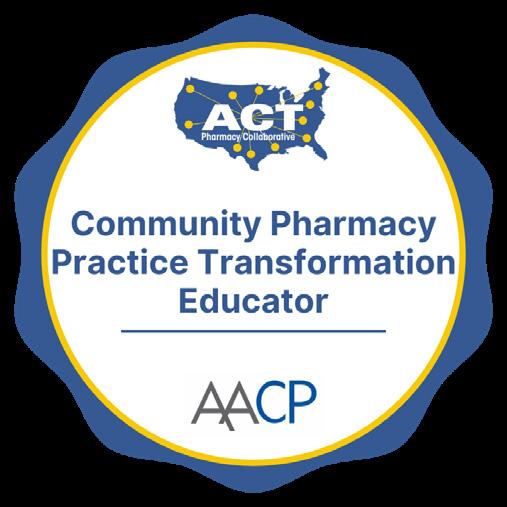
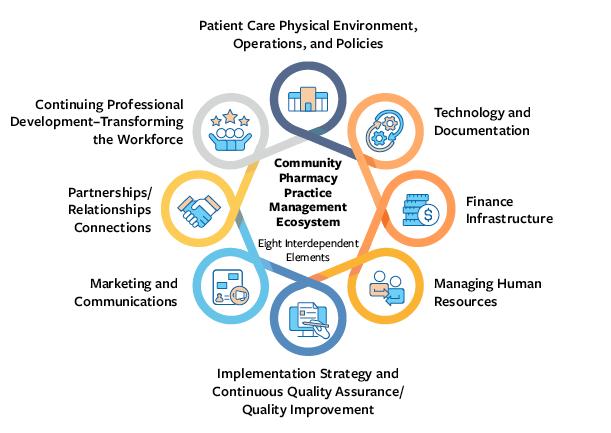
this document with additional community pharmacy practice employers, pharmacists, pharmacy technicians, and within the Academy.
The 2024–2025 Council of Deans (COD) Pharmacy Degrees & Credentials Supporting Pharmacy Practice Taskforce had the following charges:
1. Describe the emerging education and training needed for the future of pharmacy practice in team-based care.
2. Conceptually articulate the roles that could be delegated under pharmacist supervision.
3. What, if any, roles, such as training and education, should academic pharmacy consider concerning pharmacy technicians or other mid-level pharmacist assistants?
Deliverable: The taskforce provided interim and final reports on its work. The taskforce final report can be found in the libraries of the COD and COF Connect Communities.
The 2025–2026 Council of Deans (COD) Standard of Care Taskforce aspires to show how regulation in pharmacy practice is essential for advancing the profession and improving patient care. The taskforce charges are to:
1. Develop educational programming on how standard of care regulatory models can support practice transformation and advanced scope of practice, as well as advocacy guidance, to pursue a standard of care regulatory model in a state.
2. Develop standard of care-related programming resources for local, state or regional meetings hosted by colleges and schools of pharmacy.
3. Contribute to the national advocacy agenda for standard of care regulatory models for the Academia-Community Transformation (ACT) Pharmacy Collaborative.
A vital component of pharmacy academia, Research and Scholarship, is fundamental to faculty promotion and tenure. Essential to the contributions to the “body of knowledge,” research encompasses all areas of scholarship as defined by Boyer and outlined in the Report of the 2023 AACP Council of Deans Taskforce on Pharmacy Research and Scholarship, (e.g., scholarship of discovery, integration, application or practice, teaching and learning). The goals and objectives under the Research and Scholarship priority area call for increased and ongoing support of faculty and student research, educational programming focusing on researcher development and collaborations, as well as the development of organizational infrastructure with sustainable pathways to graduate education, research careers and fellowships within pharmacy schools and the pharmaceutical industry.
The Guided Grant Writing for Pharmacy Faculty program launched in February 2025 with 29 participants who committed to completing AACP Learn modules on grant writing, meeting monthly with facilitators and AACP staff to discuss grant writing and preparing a research or research career development proposal during the course of the program. Program participants aim to have proposals ready for submission to funding agencies by October 2025.
The 2024–2025 Council of Deans (COD) Payment of Clinical Faculty Services Taskforce had the following charges:
1. Work with the AACP Institutional Research and Effectiveness team to review the data from the Pilot of the 2022 Patient Care Payment Models of Pharmacy Faculty Survey.
a. Create a process to enlist CEO Deans to complete the Patient Care Payment Models of Pharmacy Faculty Survey in the 2024–2025 academic year.
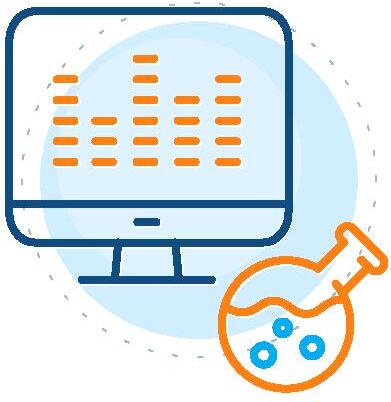
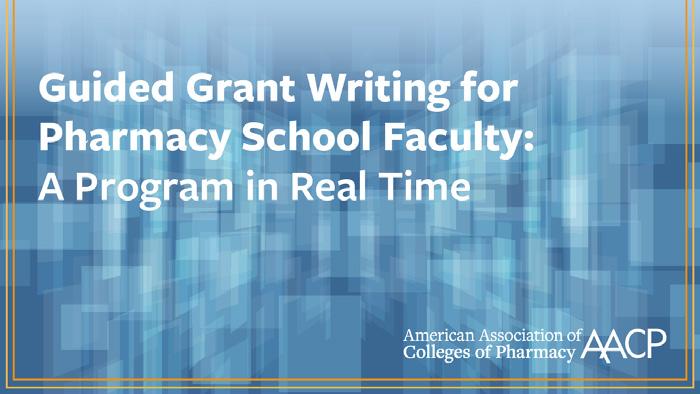

b. Identify exemplar practice plans that colleges and schools of pharmacy have implemented for clinical faculty.
2. Assess barriers to Centers for Medicare & Medicaid Services (CMS) “Incident-to-Billing” by pharmacists among the 12 Medicare Administrative Contractors (MAC) and propose ways to address these barriers.
3. If CMS plans to move toward a “value-based payment” system by 2030, how might the Academy address quality-based metrics that will provide pharmacists with the ability to understand, analyze and expand quality control outcomes associated with drug therapy across all health care sectors?
4. Discuss how faculty contracts may be constructed in the future, given the changes above.
Deliverable: The taskforce provided interim and final reports on its work. The taskforce had a poster accepted for Pharmacy Education 2025 (AACP Annual Meeting) in Chicago. The taskforce final report can be found in the libraries of the COD and COF Connect Communities.
The landscape of post-graduate training is shifting. Resident numbers could decrease, concurrent with generational changes in residents’ willingness to participate in Teaching Certificate Programs (TCPs), which many academic pharmacy programs have benefited from. A role still exists for interdisciplinary research training in T32s through the National Institutes of Health (NIH) funded Clinical and Translational Science Awards (CTSAs). There may also be an opportunity to provide training programs at academic pharmacy programs to practicing pharmacists. The 2024–2025 Council of Deans (COD) Residencies, Fellowship, Training Grants and other Training Programs Taskforce was charged with considering:
1. What impact may these potential changes to pharmacy resident engagement have on Pharm.D. education?
2. How many colleges and schools of pharmacy are currently engaged in T32 training programs? What do these programs involve?
3. Will currently practicing pharmacists look to advance their competence in areas necessitating the creation of mini-residencies/certificate-training programs offered among academic pharmacy (maybe in partnership)?
4. Assess the impact of CMS clawbacks on PGY1 residency training programs on the Academy.
Deliverable: The taskforce provided interim and final reports on its work. The taskforce had a poster accepted for Pharmacy Education 2025 (AACP Annual Meeting) in Chicago. The taskforce final report can be found in the libraries of the COD and COF Connect Communities..









































































After more than a decade of dedicated leadership, Dr. Gayle Brazeau is stepping down as Editorin-Chief of the American Journal of Pharmaceutical Education at the end of 2025. Under her guidance, the Journal has flourished, reaching new heights in scholarly impact, editorial excellence and global visibility. We are deeply grateful for her years of service, and we applaud her many accomplishments, including the successful partnership with Elsevier, a global leader in information and analytics.























































































































































Dr. Brazeau has significantly broadened the Journal’s international outreach, making it more accessible and influential worldwide. Under her leadership, the editorial team and board expanded in number and expertise, ensuring a multifaceted and knowledgeable group to assist with leading the Journal.


In early 2025, AACP issued a call for applications for the Editor-in-Chief role and received 22 applicants. The search committee conducted phone screens with three semi-finalists and two were selected for in-person interviews with the AACP Board of
Directors in July 2025. The new Editor-in-Chief will assume the position by January 1, 2026.
On behalf of the AJPE editorial team and board, as well as the broader pharmacy education community, we extend our heartfelt thanks and best wishes to Gayle on her future endeavors.
In times of uncertainty, one of the most essential tools that help organizations succeed is a contemporary strategic plan. When associations and schools of pharmacy have a robust plan, and “live” that plan, they are better able to not only survive, but thrive, in difficult times. Having a clear “true north,” with respect to purpose and goals, allows leaders to make important adjustments when faced with unexpected situations. The AACP Argus Commission Forecast, which was published for the second time in 2025, provides our member institutions with guidance regarding potential future events that will impact pharmacy education. The intent of the report is to provoke thought and discussion within colleges and schools of pharmacy, helping to ensure that strategic planning efforts prepare our institutions to weather future storms. It provides AACP, as an association, with similar guidance.
The AACP Argus Commission Forecast 2025 relied on the same methods as used last year, with the 2024–2025 Argus Commission members, led by chair Todd Sorensen, developing 43 scenarios that were considered by over 400 survey respondents, exploring the likelihood that those scenarios would come to pass in the next five years. The report includes predictions in five areas critical to the pharmacy academy—financing pharmacy education; research and graduate education; pharmacy practice; the future of pharmacy education; and the future role of artificial intelligence in research, education and practice. Narratives prepared by Argus commissioners and other invited expert authors provide context and commentary in those areas. We hope this report provides our members and Association leaders with ongoing guidance to help prepare, strategically and tactically, for potential future events.

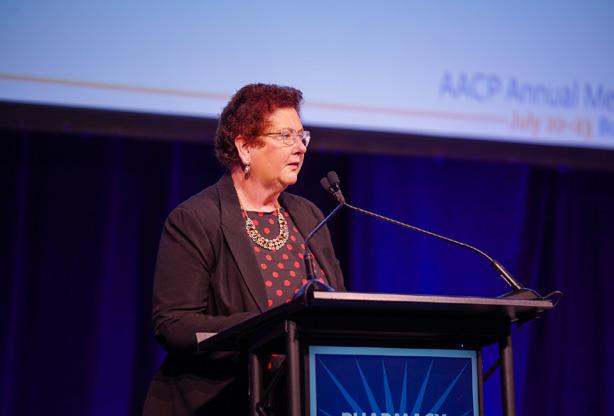


Over the past year, the Senior Director of Development has collaborated with CEO Lee Vermeulen and senior staff to implement strategies aimed at expanding AACP’s network across pharmaceutical, educational, digital technology, and related industries. A major milestone was the launch of the Corporate Partnership Program (CPP) at Pharmacy Education 2024 in Boston. This new initiative offers partners a broad range of engagement opportunities in exchange for a fixed annual financial commitment. Our inaugural partners include CVS, Echo-Interactive LLC, the National Association of Chain Drug Stores (NACDS) Foundation, Rite Aid, Walgreens and Walmart.
As AACP continues to grow and adapt to the evolving landscape of pharmacy education and practice, we remain committed to identifying and cultivating new sources of non-dues revenue to support our mission and strategic priorities. While financial investment is a vital aspect of our partnerships, the benefits extend far beyond funding. Strategic collaborations enable us to provide added value to member institutions, advance research initiatives and promote innovation in pharmacy practice. Looking ahead to fiscal year 2026, we will broaden our outreach to engage new partners across pharmacy-related sectors—such as pharmaceutical manufacturers, community-based pharmacies and educational service providers—further strengthening our network and impact.
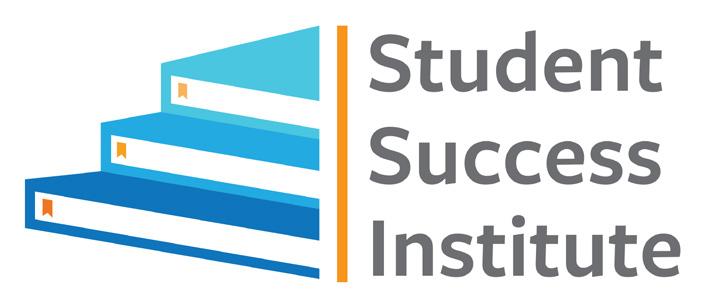
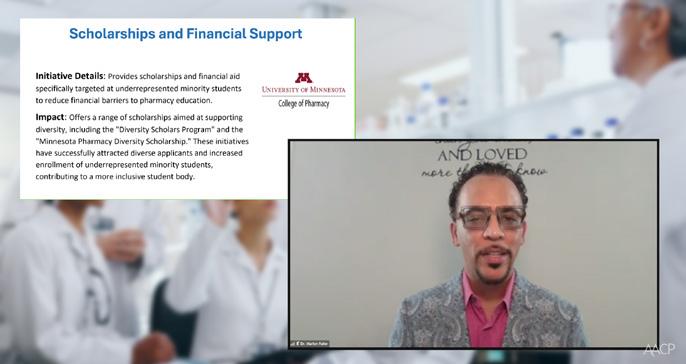
AACP held three Institutes during the 2024–2025 academic year:
1. The
Everyone Can Thrive focused on discussing solutions toward fostering and advancing a culture that promotes student success. Session offerings included faculty, staff, administrator and student discussions on various strategies, theories and models, to define and measure student success. Attendees learned different proactive approaches to identify potential crises and support students during challenging times. They also discussed practical approaches to creating a supportive learning environment to foster a sense of belonging. A panel of students and learners shared their real-life experiences and insights into student success and well-being. This
institute welcomed more than 350 registrants from 85 colleges and schools of pharmacy.
2. The 2025 Artificial Intelligence (AI) in Pharmacy Education Institute focused on approaches to using AI as an educational tool and how to personalize learning through various tracks such as didactic, experiential education, skills lab and administration. Session offerings included content for faculty and staff involved in curriculum and assessment committees, experiential education directors, administrators and staff. Attendees participated in distinct, track-based sessions. They heard from a panel of patients about their firsthand experiences with AI and its impact on patient care. This institute drew over 250 registrants from 65 colleges and schools of pharmacy.
3. The 2025 Institute for Inclusive Excellence focused on the theme, “Building a Resilient Future for Health Parity.” This virtual event brought faculty, administrators, staff and students together from pharmacy schools nationwide to advance inclusive excellence in healthcare education. Participants explored the evolving landscape impacting healthcare and discussed institutional compliance with Accreditation Council for Pharmacy Education (ACPE) standards that relate to inclusive excellence. Facilitators examined the effects of bias on professional identity formation and offered actionable strategies to build inclusive student support systems to address the needs of all. In addition, the program highlighted approaches to pursue career pathways that advance health parity. Through interactive sessions, team-based planning and expert-led discussions, participants developed tailored strategies to foster inclusive excellence at their home institutions, reinforcing AACP’s commitment to furthering inclusive excellence and advancing health equity through pharmacy education.
AACP manages a robust webinar program with a wide variety of topics. The Association hosted 39 webinars through April 2025, attracting a registration/ attendance ratio of 3,529/2,523 attendees. With webinars on the calendar
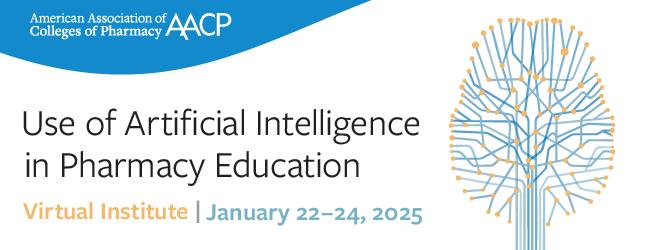
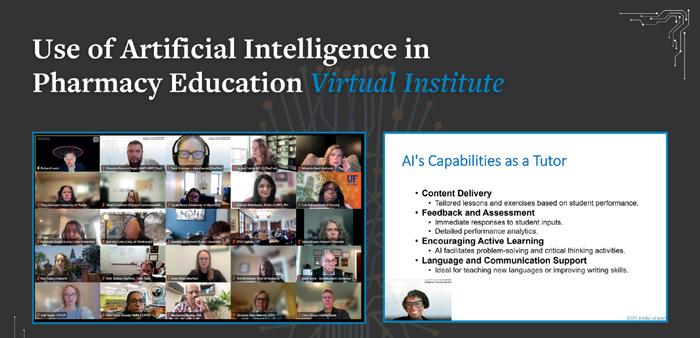
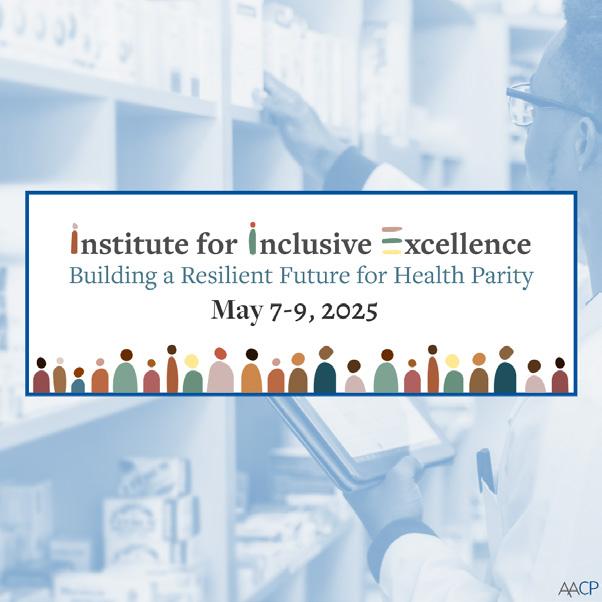
through June 2025, AACP will host 50-plus sessions in fiscal year 2025. This is the first fiscal year where all webinars were held on AACP Learn, which led to an increased attendance rate. Popular topics included wellness and resilience among faculty, staff and students; re-evaluating how educators assess; and motivating Gen Z learners. As the AACP member base grows with the open individual membership policy, we look forward to the continued opportunities and benefits the webinar program generates for the Academy.

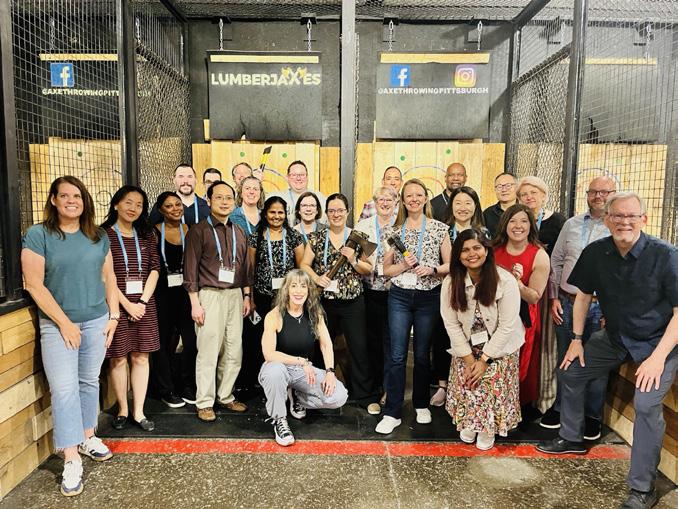
AACP offered a professional development Mid-Career Recharge program for faculty and staff. The Mid-Career Recharge program completed a second cohort and has accepted members of AACP to join Cohort 3 for the upcoming academic year.
Thirty-six individuals completed the year-long, hybrid program in Cohort 2. The goal of the Mid-Career Recharge program is for faculty and staff to reflect, refocus and recharge, devising a plan and identifying support to thrive in their next career stage. Cohort 2 highlights included an in-person retreat, virtual programming, synergy support groups, as well as group and one-onone coaching. The program was enhanced in the second year by offering more coaching and Crucial Conversations® training. Key aspects of this program that make it unique include individualized support/coaching, building a community, and improving well-being to enhance career vitality in the middle stages of an academic pharmacy career. More than 95 percent of participants agreed that completing the program enhanced their professional development and well-being.
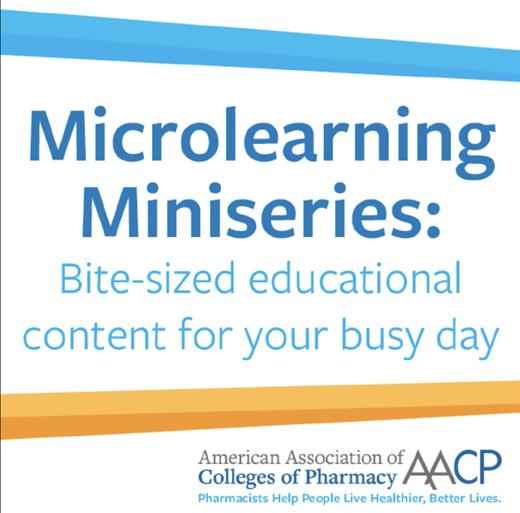
AACP’s Microlearning Miniseries provides learners with brief educational content (average time less than 5 minutes), accessible and engaging modalities. This is the second year of this free educational resource that is made available in the fall and spring semesters. The content, initially sent via email to all members, is currently archived on the AACP Learn educational platform.
The main content areas include good pedagogy, educational research and microlearning from a member. Within each of these areas, a variety of topics are presented. Some key topics included in the second year were artificial intelligence, active learning techniques and critical thinking. These miniseries are meant to fit right into busy, academic days and can serve as a tool to use as professional development for faculty and staff. The response to the microlearning series has been positive. The number of emails opened and times the microlearning sessions were shared suggest strong engagement from our members, with several hundred people viewing each microlearning session.
The AACP Transformation Center (ATC) is proud to house the AcademiaCommunity Transformation (ACT) Pharmacy Collaborative as of June 2024. The two ACT Signature Programs this year included Cohort 2 of the Community Pharmacy Practice Transformation Badge (31 participants) and convenings of the inaugural cohort of the Community Pharmacy Centers of Excellence Program (17 colleges/schools).
The ATC continued work on a project funded through the Community Pharmacy Foundation, “Establishing Measures of Quality for Communitybased Pharmacy Practice Experiential Education,” in partnership with the University of Missouri–Kansas City and the University of South Carolina. Results will be shared at the 2025 AACP Annual Meeting.
The ATC hosted the “How to Teach Medical Billing Basics: A Hands-On Workshop” to prepare pharmacy educators to teach the basics of medical billing as part of the Pharm.D. curriculum. Attendees learned about identifying medical billing codes, understanding documentation components, and how to create lesson plans that integrate into the curriculum. This workshop attracted over 85 attendees from 62 colleges and schools of pharmacy.
The Pharmacy Academia Implementation Science (PAIS) Community was created to inspire the pharmacy academy to cultivate and promote the impact of dissemination and implementation science on pharmacy practice and pharmaceutical sciences.



AACP Learn launched at the 2025 AACP Annual Meeting in July, marking a significant step forward in providing accessible, high-quality professional development for academic pharmacy professionals. During the summer, two certificate programs were introduced: “Certificate in Leadership Excellence for Academic Pharmacy” and “Choose Your Own Adventure: A Reflective Journey in Personal and Professional Development.” In Fall 2025, AACP began hosting and archiving all webinars on the platform. Members receive complimentary access to archived content, including Microlearning Miniseries and posters.
Throughout the past year, institutes and workshops have been offered through AACP Learn, including the Student Success Institute (October 2024), “How to Teach Medical Billing Basics” (November 2024), “Use of Artificial Intelligence in Pharmacy Education” (January 2025), and the Institute for Inclusive Excellence (May 2025). The Grant Writing Program, launched in February 2025, is also supported on the platform.
In April 2025, AACP introduced “Soaring into SOTL: Learning the Basics of Engaging in the Scholarship of Teaching and Learning,” a certificate program designed to develop skills in educational research. AACP has integrated Credly into AACP Learn, enabling digital badges to be awarded upon program completion. AACP staff continue to add content to meet the evolving needs and preferences of its diverse and expanding membership.

Beginning in 2023, AACP hosted the second cohort of the Aspiring Academics, striving to strengthen pharmacy students’ understanding and commitment to pursuing a career in academic pharmacy. Twenty-eight pharmacy students were selected to participate in the year-long program. Students received guidance from a faculty mentor from their school and were part of a small group of students from across the country guided by an AACP mentor. Students completed online modules about academic pharmacy, participated in interactive discussions and online networking events, observed an AACP committee meeting or other Association activity, and completed a group
project. The program culminates with an in-person attendance at the AACP Annual Meeting where they will present a poster of their project, attend meeting sessions, including the Teachers Seminar, and celebrate with a recognition and networking event. We also received funds from the BoyleLove family to establish the Aspiring Academics Fund, which will support at least one student participating in the Aspiring Academics program each year through a scholarship. The Boyle-Love Endowment is being administered by the American Foundation for Pharmaceutical Education (AFPE).
In 2025, the Pharmacy Career Information Council (PCIC) was reestablished with a new charter endorsed by 14 national pharmacy associations. Originally created in the 1990s as the Career Information Clearinghouse, the PCIC serves to centralize and share accurate, up-to-date information about pharmacy education and career pathways. Its mission is to support prospective and current student pharmacists in accessing contemporary and accurate information regarding pharmacy education and pharmacy career pathways. This is accomplished through increasing awareness of diverse careers in pharmacy, collaborating across multiple pharmacy organizations to have a collective voice for recruitment of the next generation of pharmacy professionals, and sharing information across organizations related to application, student enrollment and workforce trends.
This year, the PCIC contributed to updates on the Pharm4Me website, including new content for the “Careers in Pharmacy” pages. The Council also hosted a “Learner Tour” for students, residents and fellows interested in association management.
The Pharmacy is Right for Me (Pharm4Me) campaign advanced its engagement of prospective students and influencers through the core pillars of outreach, messaging, resources and partnerships. In 2025, we launched a redesigned Pharm4Me website featuring updated recruitment materials, real stories from pharmacy professionals, an enhanced Pharmacy Career Quiz and new content highlighting careers in pharmacy, research and pharmacy
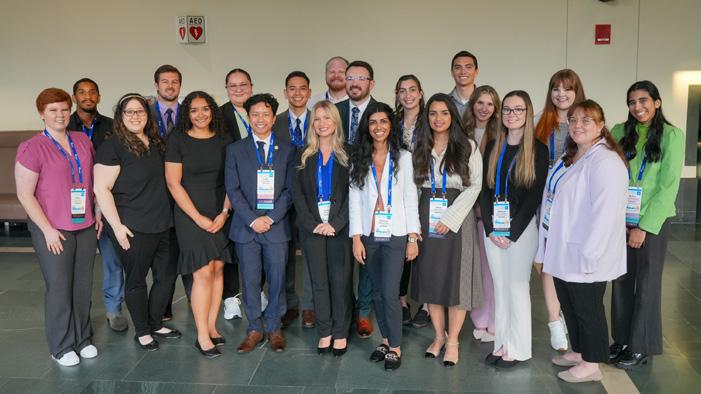
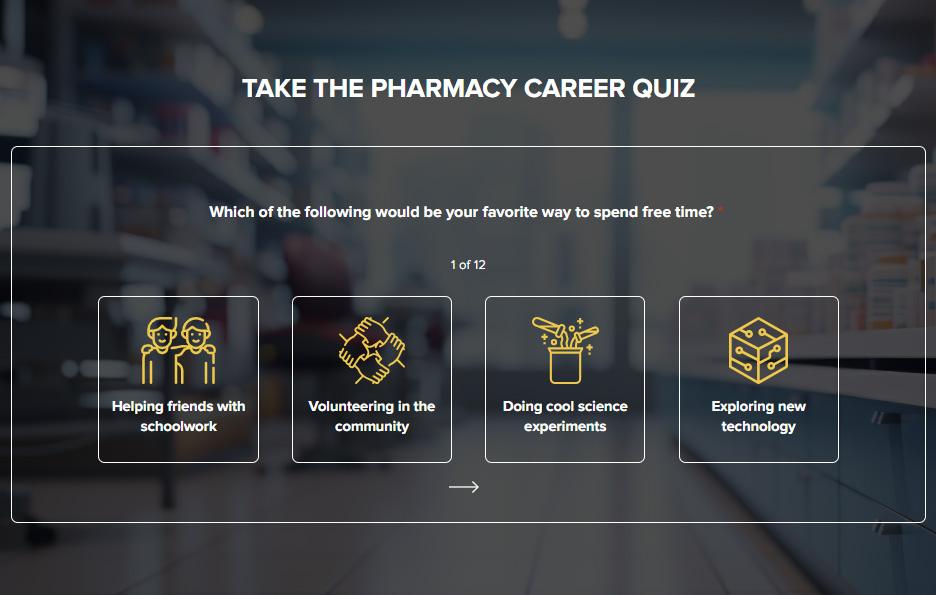

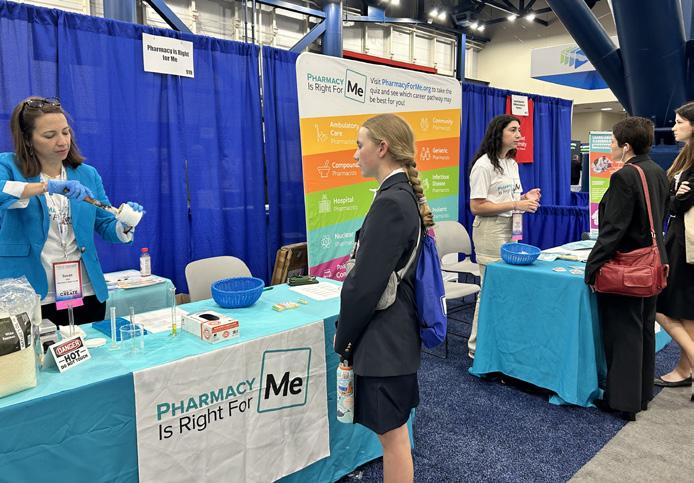
Building the Future of Pharmacy
technician roles. The refreshed site helped drive growth on social media, reaching over 8,600 followers on Facebook and Instagram.
We maintained our monthly Pharm4Me newsletter, which saw a tremendous increase in subscribers from 1,444 in May 2024 to 3,570 in May 2025. Pharm4Me also had a strong presence at in-person and virtual events, including HOSA-Future Health Professionals (formerly Health Occupations Students of America) and National Association of Advisors for the Health Professions (NAAHP). Our annual Virtual Pharmacy School Fair saw participation from 92 schools and over 1,000 student registrants—nearly double the previous year’s total—in large part due to a new feature in which schools had the opportunity to host workshops covering important topics pertinent to prospective students, such as how to write a strong personal statement and hearing from current students via a student panel.
The AACP Board of Directors has approved a proposal to launch a Student Ambassador Program in 2026. This program will provide student ambassadors with leadership experience, networking opportunities and a platform to make a meaningful impact. It will also give pharmacy schools greater visibility and a chance to showcase their programs to a broader audience. Additionally, AACP and Pharm4Me will be able to connect with more students through engaging, authentic content, without incurring the high costs of external marketing.
To support student pharmacists, AACP partnered with CVS Health and Walmart to provide financial assistance. Twenty-one students received $20,000 scholarships through CVS Health and seven students received $5,000 scholarships from Walmart in 2024–2025, totaling over $450,000 awarded. Both programs will continue in 2025–2026. AACP also launched a new resource guide to help students navigate financing their pharmacy education.
AACP supports students applying to pharmacy education through three centralized application services: PharmCAS, PharmDirect and PharmGrad. PharmCAS remains the largest, with over 12,000 applicants in the 2023–2024 cycle, an 8.7 percent increase from the previous year. An infographic highlighting this cycle’s key data is available at www.pharmcas.org/sites/ default/files/2024-01/ApplyingtoPharmacySchool-2022-23.pdf.
The 2024 AACP Association Awards were presented at Pharmacy Education 2024 in Boston.
The Robert K. Chalmers Distinguished Pharmacy Educator Award is named for the late Robert K. Chalmers, former AACP president and distinguished educator and recognizes excellence in pharmacy education.
Frank Romanelli, Pharm.D., M.P.H., FAPHA, BCPS, AAHIVP, of the University of Kentucky was recognized for his outstanding achievements as an educator and mentor, his innovations in the classroom, and his overall impact on pharmacy education and the profession.
The Volwiler Research Achievement Award was established as the research prize in academic pharmacy to honor the late Ernest H. Volwiler, former president and research director of Abbott Laboratories. The purpose of the award is to acknowledge an individual within the ranks of pharmacy education recognized by his or her peers as one of the leading research workers in a given area of the pharmaceutical and clinical sciences, pharmacy practice and the social and administrative sciences, and for outstanding contributions to the respective disciplines.
James E. Polli, Ph.D., of the University of Maryland was recognized for his pioneering research in pharmaceutics and his dedication to education and development of new programs, including the university’s Master of Science in Regulatory Science program.
The intent of the Paul R. Dawson Award for Excellence in Patient Care Research is to recognize an active scientist within the ranks of pharmacy education as a leader in the broad range of research related to health services delivery directly affecting patient outcomes, including basic, clinical,
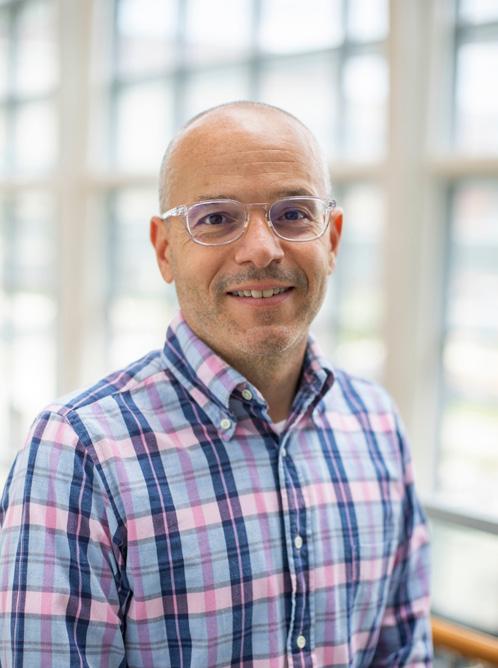

translational and health services research. Since 2015, the award criteria have included all research that has made sustained contributions to the quality of patient outcomes. The award was endowed by Amgen in honor of its former Vice President of Marketing and Sales Paul R. Dawson.
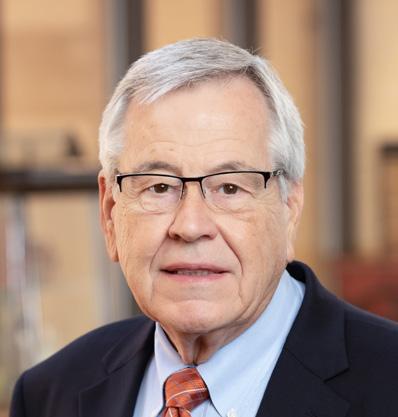
M. Lynn Crismon, Pharm.D., FCCP, DABCP, BCPP, of the University of Texas at Austin was recognized for his internationally renowned work in psychopharmacology and the development of evidence-based guidelines for treating patients with mental health disorders.
The Rufus A. Lyman Award is presented annually to the author(s) of the best paper published in the American Journal of Pharmaceutical Education.
Authors of “NAPLEX Preparation Program Characteristics and Resources Associated With First-Time Exam Pass Rates” received the 2024 Rufus A. Lyman Award. The authors are:
• Diana M. Sobieraj, Pharm.D., FCCP, BCPS, of the University of Connecticut
• Aleda M.H. Chen, Pharm.D., Ph.D., FAPHA, of Cedarville University
• Michael P. Kelsch, Pharm.D., BCPS, of North Dakota State University
• Lisa Lebovitz, J.D., M.S., of the University of Maryland
• Sarah A. Spinler, Pharm.D., FAHA, FCCP, FSHP, AACC, of Binghamton University, The State University of New York
• Mary E. Ray, Pharm.D. of the University of Iowa
The Lawrence C. Weaver Transformative Community Service Award is presented annually to one college or school of pharmacy, demonstrating a major institutional commitment to addressing unmet community needs through education, practice and research.
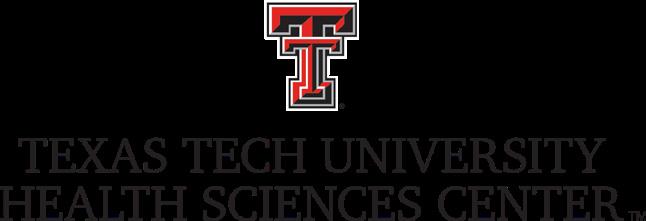
Texas Tech University Health Sciences Center Jerry H. Hodge School of Pharmacy was recognized for its commitment to addressing unmet community needs through education, practice and research.
The AACP Distinguished Teaching Scholar Award is designed to recognize the excellence of our academic pharmacy faculty engaged in and/or supporting scholarly teaching and the scholarship of teaching and learning. The AACP Distinguished Teaching Scholars are models for advancing the profession of pharmacy through education by enhancing student learning and the knowledge base of teaching and learning in professional and/or graduate pharmacy education.
Two faculty members were recognized in 2024 for their excellence in scholarly teaching and the scholarship of teaching and learning:
Jeanne Frenzel, Pharm.D., Ph.D., BCSCP, of North Dakota State University
Jacqueline McLaughlin, Ph.D., of the University of North Carolina at Chapel Hill
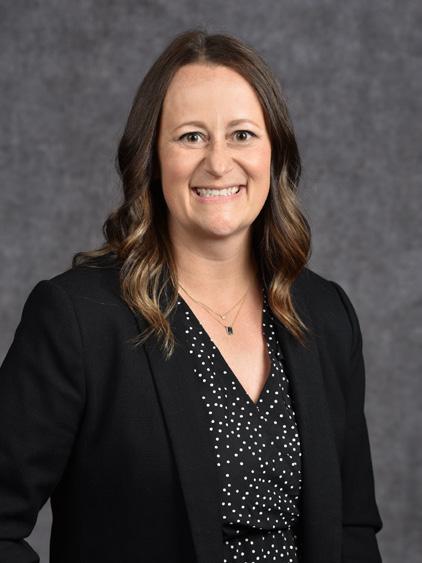
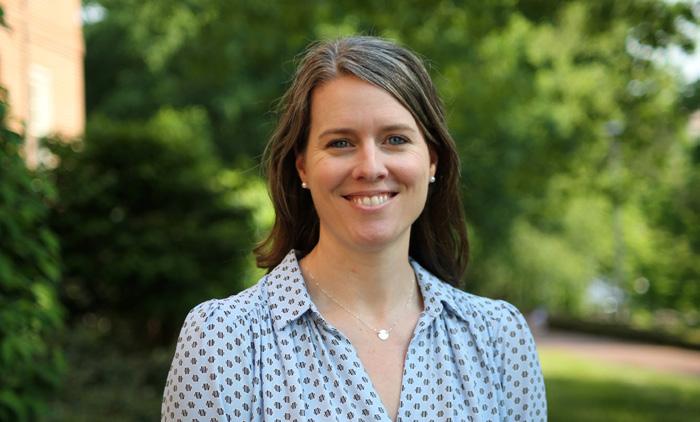
Barbara Wells, Pharm.D., of the University of Mississippi School of Pharmacy was recognized for her rich portfolio of accomplishments related to instruction, leadership, service and scholarship for more than two decades.
The Grace and Harold Sewell Memorial Fund was recognized for its impact on librarians’ active engagement in AACP, within their schools’ pharmacy education curriculum and across the Academy for over two decades.
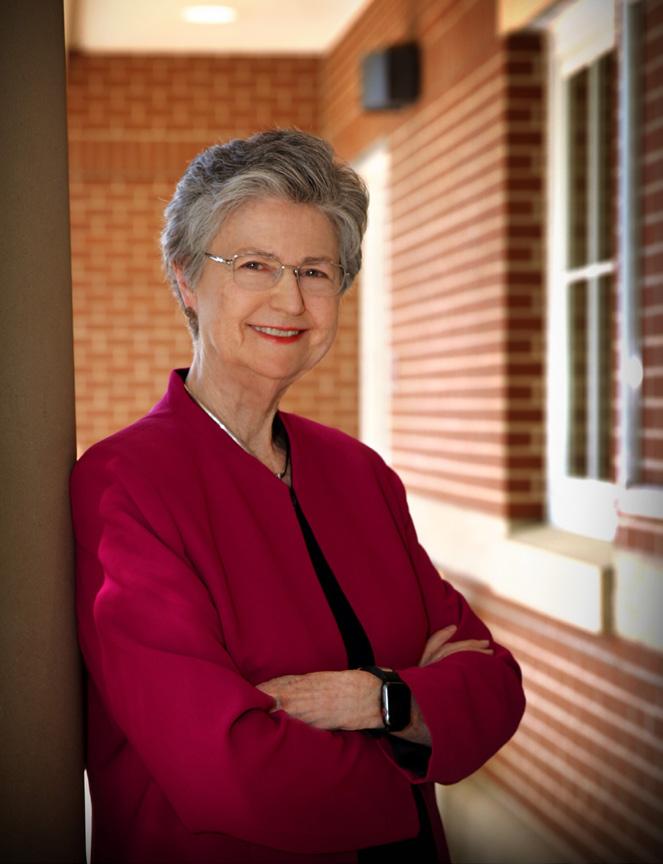



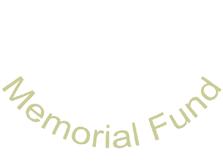




























































































































































































Pharmacists Help People Live Healthier, Better Lives.



















































































